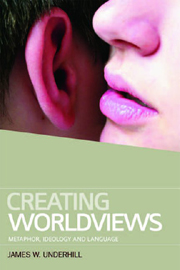Book contents
7 - The Language of Czechoslovak Communist Power
from Part II - Case Studies in Metaphor
Published online by Cambridge University Press: 12 September 2012
Summary
‘Jsme jiný svět.’
‘We are another world.’
(Kliment 1979, qtd in Fidelius 1998: 167)DOES IT MAKE ANY SENSE?
Critics of communism have never been rare, but during the Cold War, critics were obliged to find arguments to defend the West, the American way of life, and democracy as we understood it and enjoyed it in Europe. Since the breakdown of the Soviet model, the Western press and public opinion have on the whole tended to conclude that the failure of the USSR and its satellite states logically reflects our own success. ‘We won the Cold War,’ we like to tell ourselves. The Western press hurried to bury Marxism with slogans like ‘Communism is dead!’ And the euphoria of victory whipped up a din of celebration as the iron curtain opened up to us and our way of living, working, consuming and organising the State and the economy. In all that excitement, the aspirations and objectives of communism were often dismissed or forgotten. Since the end of the Cold War, intelligent comment on alternatives to the market economy has become rare. It seems that opposition forces us to sharpen our wits: lack of opposition enfeebles the critical, creative and speculative faculties of the mind. Self-satisfaction induces intellectual and political apathy. To many people today it appears odd, if not absurd, that Karl Marx could have inspired millions of people in nations throughout the world to transform their societies in the hope of creating a humanitarian world community in which would reign the guiding principle of the greatest good for the greatest number.
- Type
- Chapter
- Information
- Creating WorldviewsMetaphor Ideology and Language, pp. 92 - 127Publisher: Edinburgh University PressPrint publication year: 2011

